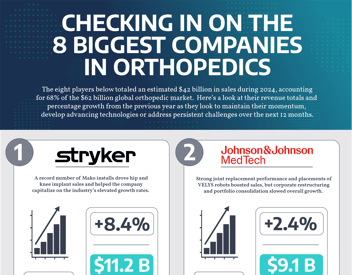The integration of robotics in surgical settings represents one of the most transformative advancements in modern healthcare. As technology advances, the adoption rate of robotic systems in operating rooms has accelerated, driven by their potential to enhance surgical precision, reduce patient recovery times, and minimize human error. Robotic surgery platforms, such as the da Vinci Surgical system or Stryker Mako platform, have become commonplace in hospitals around the world, signaling a robust growth trajectory. This growth necessitates a parallel evolution in the manufacturing of complex, high-precision instruments and components that these robotic systems require.
Robotic Components
Robotic components form the backbone of any surgical robot, providing the necessary movement and precision. Such a level of precision hinges on the exact interlocking of meticulously crafted gears and counterweight.
With modern state-of-the-art manufacturing plants, Intech is an expert in production, assembly and testing of flawlessly precise robotic components made of aluminum, stainless steel and various plastics that conform to the most stringent industry standards.
Key Elements:
- Robotic components tailored for medical applications
- Ultra-precision grinding to tolerances as tight as .0001”
- Components for minimally invasive surgery
- End-effectors and navigated instruments
- Assembly & testing of complex instruments
Surgical Navigation Arrays
Surgical navigation arrays are critical for the accurate placement and movement of surgical instruments. These systems rely on a combination of sensors, cameras, and tracking devices to provide real-time data to the surgical team. Manufacturing these arrays involves the integration of electronic and optical components that must function flawlessly in high-stakes environments. The contract-manufacturers need expertise in optical engineering, electronics manufacturing services (EMS), and software integration to ensure that these arrays deliver precise and reliable feedback during surgical procedures.
Multi-step machining of a surgical navigated registration probe.
Robotic Instrumentation that attaches to the Robot
The end-effectors and tools that attach to the robotic arm are pivotal for performing the surgical tasks. These instruments, such as navigated drivers, forceps, and scissors, must be manufactured to exact specifications with materials that are biocompatible and capable of undergoing frequent sterilization. The complexity of these tools requires contract-manufacturers to utilize advanced manufacturing technologies such as 3D printing for metals and polymers, laser cutting, and CNC machining. Moreover, these tools often require custom solutions tailored to specific surgical procedures, which underscores the need for a contract-manufacturer with robust R&D capabilities and a flexible production line.
robotic arm are pivotal for performing the surgical tasks. These instruments, such as navigated drivers, forceps, and scissors, must be manufactured to exact specifications with materials that are biocompatible and capable of undergoing frequent sterilization. The complexity of these tools requires contract-manufacturers to utilize advanced manufacturing technologies such as 3D printing for metals and polymers, laser cutting, and CNC machining. Moreover, these tools often require custom solutions tailored to specific surgical procedures, which underscores the need for a contract-manufacturer with robust R&D capabilities and a flexible production line.
Robotic end-effector (acetabular cup impactor) designed by intechlab R&D.
Key Considerations When Selecting the Ideal Partner for Success
Selecting the right supplier to partner with is critical to the success of medical device companies venturing into robotic surgery. Key considerations include:
- Expertise and Certifications: The
 contract manufacturer should have a proven track record in the medical devices sector, particularly in robotics. Relevant certifications such as ISO 13485 for medical devices and ISO 9001 for quality management systems are essential.
contract manufacturer should have a proven track record in the medical devices sector, particularly in robotics. Relevant certifications such as ISO 13485 for medical devices and ISO 9001 for quality management systems are essential. - Collaborative R&D Efforts: A contract manufacturer that can work closely with the medical device company in a collaborative environment to innovate and refine products through thorough Design-for-Manufacturability (DFM) is highly desirable. This collaboration can significantly shorten the time to market and improve the efficacy of the surgical
Navigation arrays assembled prior to laser mark and final inspection - Technological Capability: It is vital that the contract manufacturer has the latest manufacturing technologies and the ability to innovate as new needs arise. This includes capabilities in surface grinding, ID/OD grinding, honing, and precision machining.
- Supply Chain and Scalability: The ability to manage a global supply chain including coating and special process vendors as well as being in a position to scale production up based on demand is crucial, especially in a field as dynamic as robotic surgery.
- Quality and Reliability: Given the high stakes involved in surgical applications, the highest levels of quality and reliability are non-negotiable. The contract manufacturer must demonstrate robust quality control processes and a strong track record of reliability.
As Robotics continues to revolutionize surgery, the partnership between Medical Device companies and contract manufacturers will become increasingly vital. The right partnering not only enhances the capabilities of robotic surgical systems but also ensures that these life-saving technologies are produced to the highest standards of quality and precision. The future of surgery is here, and it is intricately linked to the advancements in manufacturing and collaborative innovation.
Why Intech?
Over the years, Intech has developed an intimate knowledge and understanding of the surgeons’ needs as well as the patient outcomes in close collaboration with the Medical Devices companies. This enables Intech to be a source of information, education and inspiration in any collaboration especially in face of the speed of introduction of new technologies. In the way we work together, Intech is not only the partner of choice but the inspiring and innovative force to bring in your new developments and new generations of surgical orthopedic and minimally invasive products.
Because we tech care.




.webp?width=352&name=thubnail%20(1).webp)
Leave a Comment